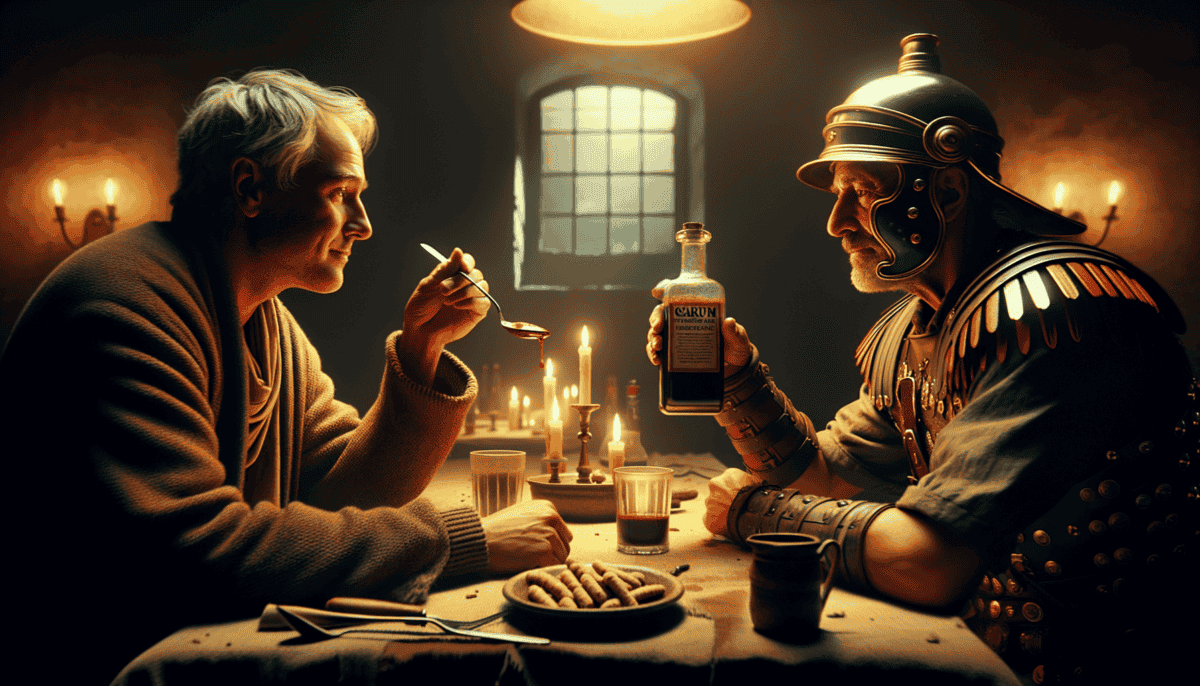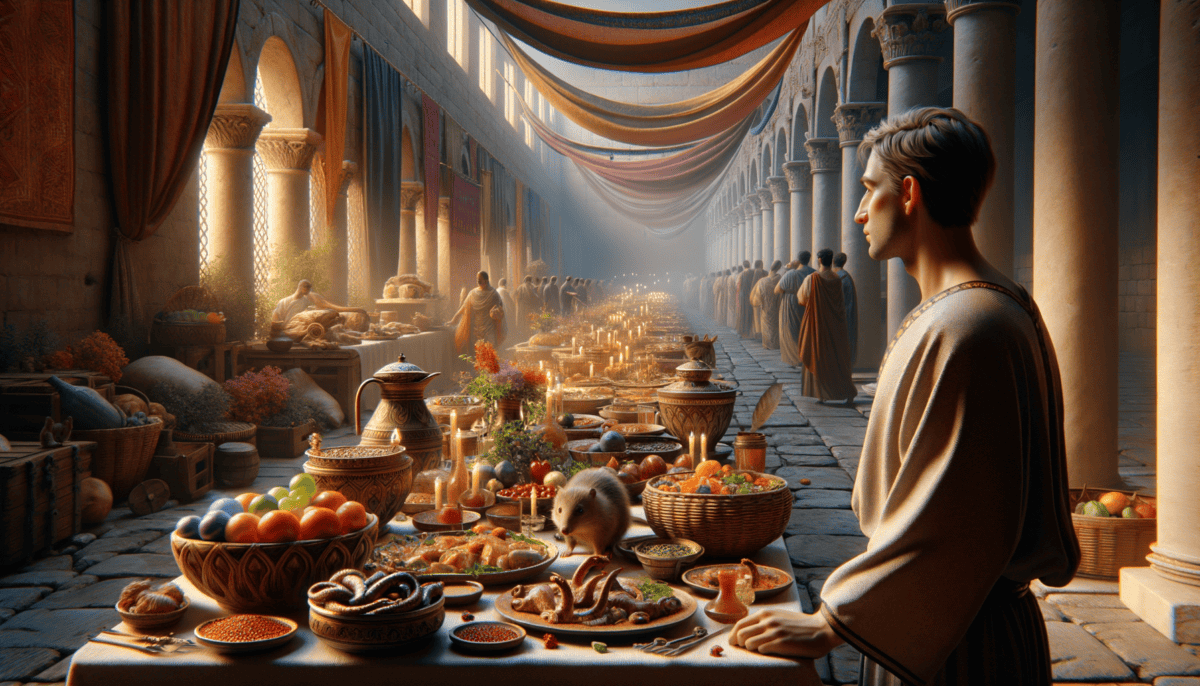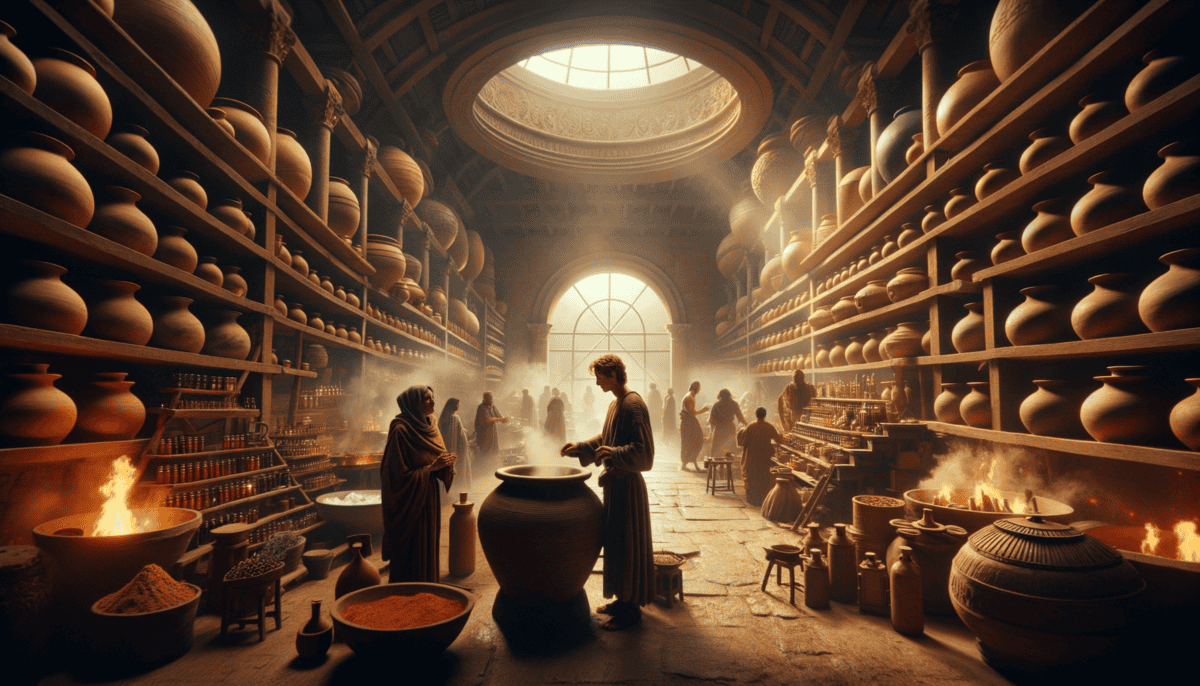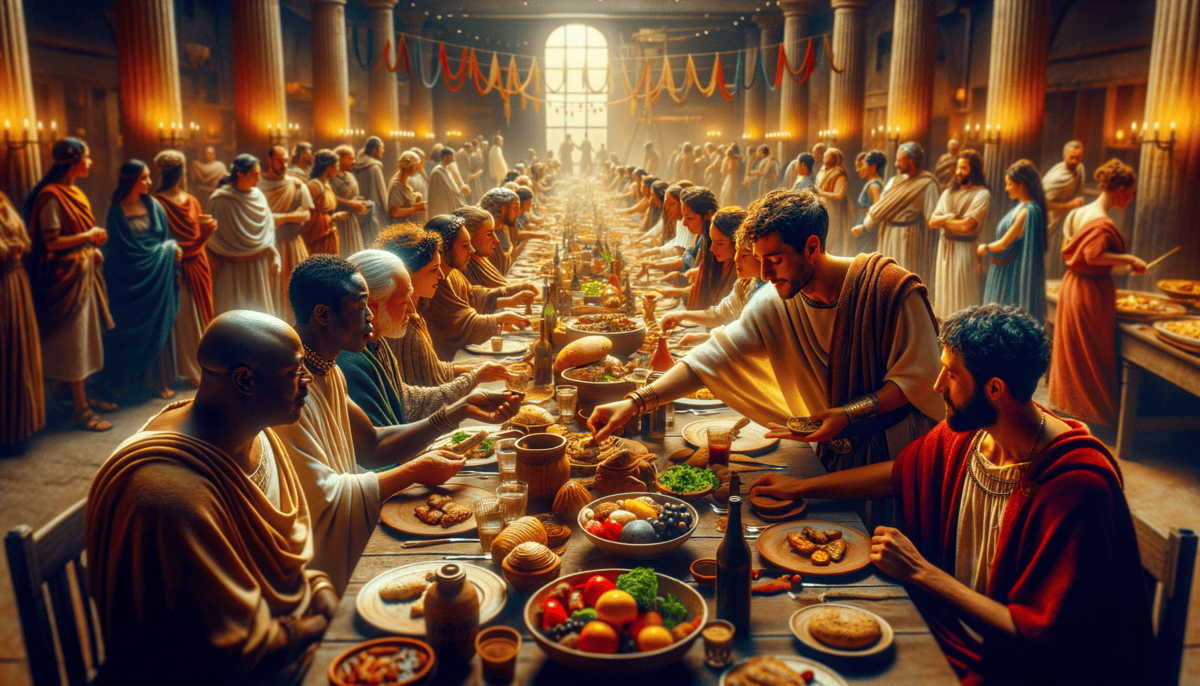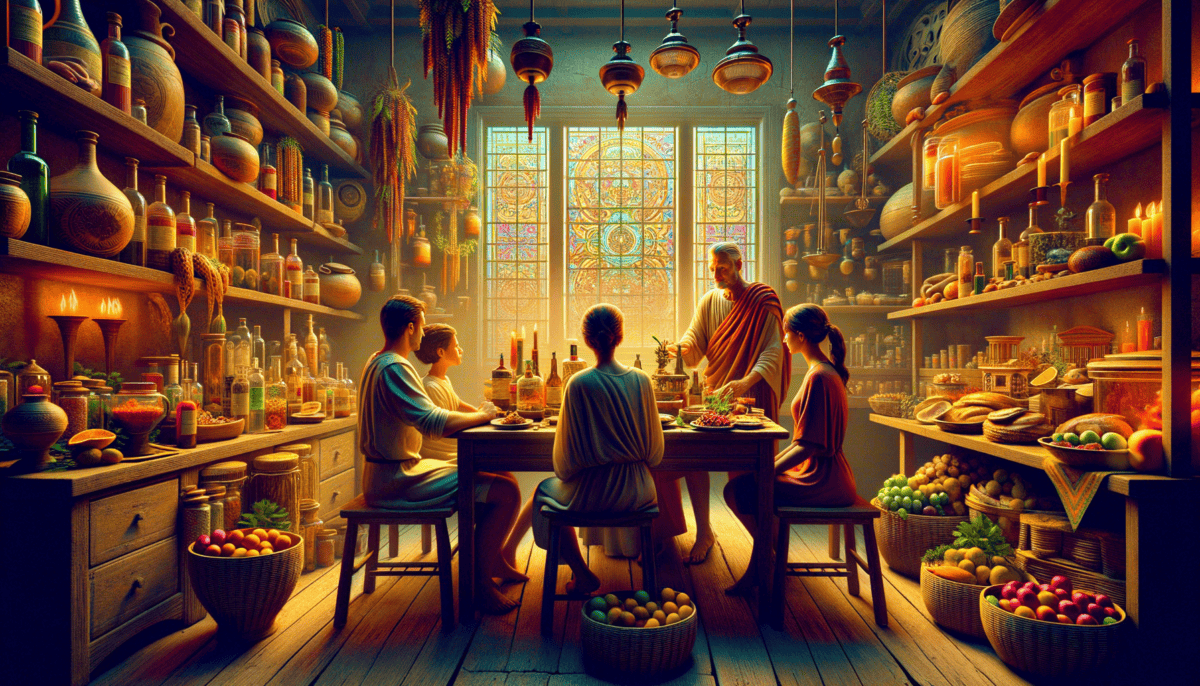The Market of Wonders
Marcus wiped sweat from his forehead as he pushed through the bustling crowd at the Forum Boarium. The morning sun sparkled on the Tiber River nearby, and the air buzzed with excited voices speaking many different languages.
"Watch where you're going, young man!" called a merchant as Marcus nearly knocked over a clay pot of olive oil.
"Sorry!" Marcus squeaked, stepping carefully around colorful displays of fruits and spices. At twelve years old, he wasn't quite tall enough to see over the market stalls, but that didn't stop his curiosity.
His father, a successful merchant, had finally allowed him to explore the marketplace alone. The sights, sounds and smells made Marcus's head spin with excitement.
"Fresh figs from Syria!" called one vendor.
"Pepper from India!" shouted another.
"The finest garum sauce in all of Rome!" proclaimed a third.
Marcus stopped at a stall with strange-looking fruits he had never seen before. The merchant, an older man with kind eyes, smiled at him.
"Curious about these, are you?" the merchant asked. "They're called citrons – from the far eastern lands. Would you like to smell one?"
Marcus nodded eagerly. The merchant handed him a lumpy yellow fruit. It smelled fresh and sweet, unlike anything in his mother's kitchen.
"How does it get here?" Marcus asked, carefully returning the citron.
"Ah, that's quite a tale!" The merchant's eyes twinkled. "These fruits travel for months on ships and camel caravans. They cross deserts, mountains, and seas to reach our market."
A World of Flavors
As Marcus continued through the market, he started noting all the different foods and where they came from:
• Spices from Arabia and India
• Olives from Greece
• Dates from Egypt
• Fish sauce from Spain
• Wheat from Africa
A woman in bright silk robes caught his attention. She was selling something that looked like tiny seeds.
"What are those?" Marcus asked.
"Pepper, young master," she replied with a smile. "Worth its weight in gold! A pinch of this will make any dish fit for an emperor."
Marcus's eyes widened. "Gold? For such tiny things?"
"Indeed! These little seeds travel farther than most Romans ever will. They come all the way from India, carried by brave merchants across dangerous seas."
Near the river, fishmongers displayed their fresh catch in beds of ice. Some fish were familiar, caught in the nearby Tiber. Others were strange creatures from distant seas, preserved in salt.
An old fisherman noticed Marcus staring at an unusual spiky fish.
"That's a sea urchin, boy," he explained. "The rich folk love them. Fancy parties aren't complete without sea urchin eggs on their tables."
As the sun climbed higher, Marcus found himself at a bread stall. The baker was pulling fresh loaves from his oven, filling the air with wonderful smells.
"Would you like a taste?" the baker offered, breaking off a warm piece. "Made with the finest African wheat and a pinch of imported salt."
Marcus took a bite. It was better than any bread he'd tasted before.
A Special Discovery
Just then, a commotion drew Marcus to the dock area. A ship had arrived with new goods from Egypt. Workers were carefully unloading large clay jars.
"What's in those?" Marcus asked a nearby porter.
"Honey from the Nile Valley," the man replied, wiping his brow. "The sweetest you'll ever taste. They say Egyptian bees make better honey because they feed on lotus flowers."
Marcus watched in amazement as more exotic foods were unloaded: dried fruits, nuts, and grains he had never seen before. Each item had its own story, its own long journey to Rome.
One day, Marcus thought, I want to travel to all these places and taste their foods myself.
As the sun began to set, Marcus knew it was time to head home. His mind was full of the amazing things he'd seen. He couldn't wait to tell his family about all his discoveries at the Forum Boarium, where the whole world came together in the heart of Rome.
Soldiers’ Simple Meals
The next morning, Marcus couldn’t stop thinking about his market adventures. As he walked through the streets of Rome, he noticed an old man sitting outside a small shop, polishing what looked like an ancient bronze helmet.
“Did you serve in the army, sir?” Marcus asked, his curiosity getting the better of him.
The old man looked up and smiled. “Twenty-five years in the legions, young man. I’m Lucius Flavius, former centurion of the Tenth Legion.”
“What did you eat when you were fighting battles?” Marcus asked, sitting down on a nearby stone bench.
Lucius chuckled. “Nothing like the fancy foods you see in the market! Here, let me show you something.” He disappeared into his shop and returned with a hard, flat brown disk.
“This is bucellatum – what we called hardtack. It’s just flour and water, baked until it’s hard as a rock. Here, try to break it.”
Marcus took the disk and tried to snap it. It wouldn’t budge.
A Soldier’s Diet
“We carried these everywhere,” Lucius explained. “They last forever and keep you going on long marches. But the real secret to our strength was this…”
He pulled out a small clay jar. “Posca – vinegar mixed with water. And this…” He showed another jar. “Garum sauce – made from fermented fish.”
Marcus wrinkled his nose at the strong smell. “You ate this every day?”
“It kept us strong! A Roman soldier’s daily rations included:
• Hardtack biscuits
• Dried meat or bacon
• Beans and lentils
• Cheese
• Wine (mixed with water)
• Salt
“Sometimes we’d hunt or trade with locals for fresh food,” Lucius continued. “But these basic rations helped us conquer the world!”
“Not usually. But we were clever – we carried portable grindstones to make flour, and built ovens in our camps when we could. Every eight soldiers shared a cooking pot and worked together to prepare meals.”
Survival Skills
Lucius stood up and gestured for Marcus to follow him into his shop. Inside, he showed the boy various tools and containers.
“See this cooking pot? We called it a vas. Each soldier carried part of the cooking gear. When we made camp, we’d put everything together.”
“What if you ran out of food?” Marcus asked.
“That’s where our training came in handy. We learned which plants were safe to eat, how to preserve meat with salt, and how to find water. Here’s a trick – wild onions often grow near fresh water sources!”
Marcus was fascinated. “Did you ever eat anything strange?”
Lucius laughed heartily. “Once, in Germania, we ate bark bread during a harsh winter. In Parthia, we tried roasted locusts. When you’re hungry, boy, you learn to eat whatever keeps you alive.”
Cooking in Camp
“Would you like to see how we cooked?” Lucius asked. He set up a small fire pit in his courtyard and pulled out some dried beans and old military cooking tools.
“First, we’d soak the beans in water,” he demonstrated. “Then add some garum for flavor, maybe some dried herbs if we had them. Simple but filling.”
As they waited for the beans to cook, Lucius taught Marcus military hand signals used to coordinate meal times in enemy territory.
“Even eating had to be done carefully during campaigns,” he explained. “No good having a nice dinner if it attracts the enemy!”
When the beans were ready, Lucius served them in a wooden bowl. Despite their simple preparation, they were surprisingly tasty.
“You see, Marcus, an army marches on its stomach. All those fancy market foods are nice, but it was simple fare like this that built the empire.”
As the afternoon sun began to fade, Marcus realized he’d learned something important. Sometimes the simplest foods could be the most valuable, especially when they helped brave soldiers defend Rome.
“Thank you for teaching me, Lucius,” Marcus said, standing to leave. “I’ll never look at bread and beans the same way again.”
Lucius smiled and patted Marcus’s shoulder. “Come back tomorrow if you’d like. I have more stories about feeding an army – including the time we had to eat our shield covers during a siege!”
The Imperial Feast
Marcus rushed home excitedly. His father had amazing news – they were invited to observe a grand feast at Senator Claudius’s villa! ️
“Remember your manners,” his mother said, adjusting his toga. “This is very different from the soldier’s meal you had yesterday.”
When they arrived, Marcus’s eyes grew wide. The dining room was huge, with beautiful painted walls. Guests lay on soft couches around low tables. Servants rushed about with silver platters. ️
Amazing Appetizers
“Look at this!” whispered Marcus to his father. A servant carried in a platter of peacock eggs decorated with colorful feathers.
“That’s nothing,” replied his father. “Watch what comes next.”
More servants appeared with strange and wonderful foods:
• Roasted flamingo tongues
• Dormice dipped in honey
• Oysters carried in snow
• Sow's udders in wine sauce
• Parrot fish from distant seas
Marcus watched a cook crack open a giant egg. Inside were tiny birds, cooked and seasoned!
Kitchen Secrets
A friendly cook named Felix noticed Marcus’s curiosity. “Would you like to see the kitchen, boy?”
In the busy kitchen, cooks worked at different stations. Some crushed rare spices from far lands. Others worked with special tools Marcus had never seen.
“We have cooks who only make sauces,” Felix explained. “And others who just work with exotic meats.”
“Is that a whole pig?” Marcus pointed to a large roasting spit.
“Yes! Watch this…” Felix cut into the pig. Inside were different stuffings in each section – sausages, doves, and even more surprises!
Rich and Poor
Back in the dining room, Marcus noticed something interesting. The guests on the higher couches got different food than those below.
“Why do some people get better food?” he asked his father.
“That’s how it works at these feasts,” his father explained quietly. “The most important guests get the best dishes.”
Marcus thought about Lucius’s simple soldier meals. “But isn’t all food important?”
“You’re learning well, son,” his father smiled. “Food tells us a lot about who we are.”
Sweet Endings
Dessert was just as amazing. Servants brought in a model of Mount Vesuvius made from cake! When they poured warm sauce on top, it looked like a real volcano.
“They spend more on one feast than some families earn in a year,” Marcus’s father said softly.
As they walked home under the stars, Marcus felt full – not just from food, but from thoughts about what he’d seen.
“Father,” he said, “I’m glad we got to see the feast. But I think I liked sharing beans with Lucius just as much.”
His father squeezed his shoulder. “That’s because you’re learning to see beyond the surface, Marcus. Food isn’t just about filling our bellies – it’s about who we share it with.”
That night, Marcus dreamed of peacock eggs and soldier’s bread, of fancy feasts and simple meals, all mixing together in his mind. Tomorrow would bring new food adventures, but for now, he had plenty to think about.
Secrets of Preservation
The morning sun warmed Marcus’s face as he walked to the food district. Today was special – he would learn from Rufus, Rome’s best food preserver!
“Welcome, young Marcus,” Rufus smiled, his hands dusted with salt. “Ready to learn how we keep food fresh?”
The Salt Room
Rufus led Marcus into a cool room filled with white crystals. “This is our most important tool – salt from the sea!”
“Watch carefully,” Rufus demonstrated. He covered fresh fish with layers of salt. “This will keep the fish good for many months!”
“But how?” Marcus asked, touching the cool salt.
“Salt is magic,” Rufus winked. “It fights tiny things that make food go bad.”
The Smokehouse Mystery
A sweet, woody smell drew Marcus to another building. Inside, meat hung from the ceiling while smoke curled around it.
“We burn special woods,” Rufus explained. “The smoke hugs the meat and keeps it safe to eat later.”
Marcus watched workers hang fresh sausages high above the fire.
“Here’s what they’ll look like in two weeks.” Rufus handed him a piece of smoky meat to taste.
Honey’s Sweet Secret
Next, they visited shelves filled with golden jars. “Honey never goes bad,” Rufus said proudly. “We use it to preserve fruits and nuts.”
Marcus dipped his finger in a jar. “It’s still fresh from last summer!”
“That’s right! Honey is special. Even the pharaohs in Egypt used it to keep food fresh.”
The Clay Pot Challenge
Large clay pots called amphorae lined the walls. Rufus showed Marcus how they sealed them with wax.
“These pots keep wine and olive oil fresh for years,” Rufus explained. “Some even travel across the sea!”
Marcus helped seal a pot:
“First, fill it carefully.
Then, clean the rim.
Add the clay seal.
Finally, pour the wax!”
Nature’s Ice Box
Underground, Rufus showed Marcus a special room.
“Feel how cold it is? We pack this room with snow from the mountains. It keeps food fresh like winter does!” ❄️
“But snow melts!” Marcus said.
“That’s why we wrap it in straw and sawdust. It can last for months!”
Sharing Knowledge
At day’s end, Rufus gave Marcus dried figs to take home.
“Food preservation is important,” Rufus said. “Without it, we couldn’t have big cities or send food to our armies.”
“Or try foods from far away places!” Marcus added.
“Exactly! Every time we save food from spoiling, we’re helping Rome grow stronger.”
Walking home, Marcus held his dried figs carefully. He thought about all the clever ways people kept food fresh. Tomorrow he would show his family how to seal an amphora, just like Rufus taught him. But first, he had some perfectly preserved figs to enjoy!
Festivals and Food Rituals
Marcus bounced with excitement as colorful decorations filled the streets. The Saturnalia festival was beginning!
The Great Feast Begins
“Today, everyone celebrates together!” Marcus’s mother smiled, placing a wreath on his head. “Even slaves eat at the same table as their masters.”
The streets filled with happy people. Children played games while grown-ups wore funny hats called pilleus.
Special Foods
“Look!” Marcus pointed at tables loaded with treats. “So many special foods!”
“Sweet honey cakes for the gods!
Fresh bread shaped like stars! ⭐
Roasted nuts with spices!
Dried fruits from far away! ”
The Temple Offering
Marcus followed his family to Saturn’s temple. People brought food gifts for the god.
Marcus placed his honey cake on the altar. He watched the sweet smoke rise up.
Community Feast
In the town square, long tables stretched as far as Marcus could see. Rich and poor sat together, sharing plates of:
| Roasted meats |
| Fresh breads |
| Sweet fruits |
| Honey treats |
“This is my favorite part,” Marcus said, watching people laugh and share food. “Everyone’s happy!”
Kitchen Magic
In homes across Rome, special recipes passed down through families came alive.
“This cake recipe is from your grandmother,” Marcus’s mother said, showing him how to mix honey and flour. “She learned it from her mother too!”
Games and Treats
Children ran through the streets playing “King of Saturnalia.” The winner got extra dessert!
“Your turn to be king!” Marcus’s friend Julia crowned him with a bread wreath.
“I declare everyone gets two honey cakes!” Marcus announced, making the other children cheer.
Evening Lights
As the sun set, families lit candles. The warm light made the food look magical. ✨
“Food tastes better when we share it,” Marcus’s father said, passing him a sweet date.
“And when we remember the old stories,” added his mother, telling tales of how Saturn taught Romans to farm.
A Special Night
Marcus lay in bed that night, his belly full of festival treats. He thought about how food brought everyone together – rich and poor, slaves and masters, young and old.
“Maybe that’s the real magic of festivals,” he whispered to himself. “Not just the special foods, but how they make everyone friends for a day.”
The sounds of celebration still drifted through his window as he fell asleep, dreaming of tomorrow’s feast day and more stories to discover.
A Culinary Legacy
The morning sun peeked through Marcus’s window as he sat at his desk, carefully writing on a fresh scroll.
Sharing the Knowledge
“What are you writing, Marcus?” his mother asked, bringing him breakfast.
“I’m making a food book!” Marcus smiled. “All the amazing things I learned about Roman food!”
Kitchen Wisdom
Marcus watched his mother make breakfast, seeing it with new eyes.
“Our bread is just like the soldiers’ bread,” he said. “But softer!”
“And this fish sauce,” his mother smiled, “comes from the same markets you explored.”
Teaching Others
Marcus’s little sister Julia watched him curiously. “Tell me a food story!”
Marcus shared his favorite discoveries:
| How food travels in big clay jars |
| Rich people’s fancy cooking |
| Ways to keep food fresh |
| Special festival treats |
Future Dreams
“When I grow up,” Marcus declared, “I want to be a food explorer!”
Making Connections
Marcus noticed how food connected everything:
“Markets connect cities ️
Soldiers share meals ✈️
Rich and poor feast together ️
Families pass down recipes ”
A Special Gift
Marcus finished his food book. He decorated it with drawings of everything he’d seen.
“This is for the library,” he said proudly. “So other kids can learn about our food too!”
Looking Forward
That evening, Marcus sat with his family for dinner. The simple meal felt special now.
“What’s next on your food adventure?” his father asked.
“I want to learn about foods from even farther away!” Marcus’s eyes sparkled. “Maybe places we haven’t discovered yet!”
The Lasting Flavor
As Marcus helped clean up dinner, he thought about all he’d learned. Food wasn’t just for eating – it told stories, brought people together, and connected the whole Roman world.
“Every meal is an adventure,” he whispered, watching the sunset paint the sky orange like sweet honey.
That night, Marcus dreamed of new foods to discover, new stories to learn, and new ways that food would keep bringing people together – just as it had done since the very beginning of Rome. ✨


